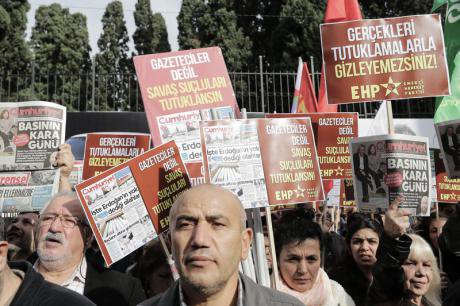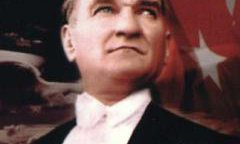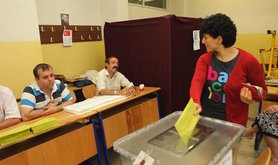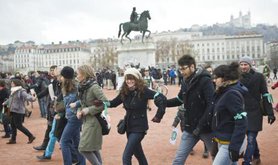
Journalists protest at arrest of newspaper editors, November 27, 2015. Demotix/ Ozcan Soysal. All rights reserved.In the aftermath of the Paris attacks, all eyes have turned on Muslims once again. Why was it that 130 innocent lives were taken in the name of Islam? The response was nothing we have not already heard. An entire belief system and its adherents could not be held accountable for the atrocities committed by the few, especially when millions of other Muslims felt the same sorrow and condemned religious extremism in every shape and form.
Not all Muslims, however, grieved. In fact, some made the conscious decision not to. The footage from a friendly soccer game between the Turkish and Greek national teams on November 17 left many in shock when it first circulated around the internet. The fans filling up the stadium in Istanbul broke a universal taboo—the moment of silence for the victims of the attacks—by chanting Islamic and nationalist slogans. But why did they choose not to grieve for Paris? And why should we be concerned about it?
Without a doubt, we need to be cautious of generalising about the sentiments of the Turkish public from the example set in the Turkish stadium. We need to be equally cautious, however, not to discard it as an anomaly, for it may not be as isolated an event as one might think.
Rethinking Paris in light of Muş, Şırnak, and Ankara
Taking a wider-angle shot of the politics of grieving in Turkey may help us explain why some Turks chose not to grieve for the lives lost in the Paris attacks. Grief is more than just an emotion. It has a politics of its own. To grieve is a political statement, which indicates that the griever shares something in common with the grieved. This could be of an intimate kind, such as friendship or kinship. It could also be of a more abstract kind, such as humanity or existence.
Not to grieve is also a political statement. The conscious decision to not grieve strips away meaning from the deceased. It reduces him/her to the position of a non-human. Doing so allows people to normalize the torturous reality of lives being taken, and saves them from an existential burden.
The examples here are numerous. In Turkey, two vivid ones come from the recent resurgence of war with Kurdish guerillas. One is the image of a dead female PKK (Kurdistan Worker’s Party) militant whose bloody body was stripped naked and left on the streets of Muş in August. Another is the image of a dead Kurdish man, whose body was dragged by an armored vehicle through the streets of Şırnak in October. While there is an ongoing investigation to find out who took the images and leaked them, no apology was issued—either by government representatives or the army—to respond to the inhumane ways the bodies of the deceased were treated.
The message sent was clear. The dead bodies of Kurdish guerillas were meant to be dismantled and displayed, and not grieved, or let alone, respected. And, as is now customary, those who chose to disagree with this message had no other option but to face the iron fist of the Turkish state in the form of riot police, rubber bullets and gas canisters.
Sadly, the response to the attacks in Ankara’s “peace rally” on October 10 leads to the inexorable conclusion that not all lives are worthy of grief. The demonstration in the Turkish capital was organized by leftist and Kurdish organizations to put an end to the ongoing conflict with Kurdish guerillas. The protesters gathered in Ankara to make the point clear that the AKP was profiteering from perpetuating violence and insecurity. That day, two bombs left more than 100 dead. Over 500 were injured. Following the attacks, the then-interim Turkish government, and the President, declared three days of national mourning.
The public response was in some ways similar to the response to Paris attacks. Some condemned the bombing. Others, however, chose not to grieve over all lives lost—for the deaths of some were deemed more worthy of grief than others. During the morning news segment on state television (TRT1), the anchorman shared a tweet sent by a viewer, which stated: “You cannot put all the deaths in the same basket. Maybe there were innocent people passing by. Make sure not to treat them equally [kurunun yanında yaş da yanmasın]”. For the tweeter, the dead participants of the demonstration were guilty of being Kurds or socialists, or because they simply were different in their ideas and practices—thus not deserving of any respect. “I completely agree,” responded the anchorman to this tweet. Facing growing criticism, he later apologized for his remarks.
One could argue that the tweet as well as the anchorman’s response are singular instances and therefore cannot be held as representative of a broader sentiment in Turkey. There is, however, something about this sentiment that keeps on surfacing every now and then—and recently, more frequently than before.
Only three days after the Ankara attacks, the Turkish national soccer team played a qualifier against Iceland. The game was hosted in Konya, one of Turkey’s most conservative cities. Prior to kickoff, the two teams lined up around the midfield circle to observe the moment of silence in order to pay respect for the lives lost in the Ankara bombings. Some in the stadium followed suite by remaining silent. Others, however, chanted the same nationalistic and Islamic slogans that were chanted in the friendly game against Greece following the Paris attacks.
The concept of transversal grief and the deliberate decision to not grieve
In her response to the Paris attacks, Judith Butler proposed “transversal grief” as a way to think about grieving beyond boundaries. This, according to Butler, requires of us “to consider how metrics of grievability work,” and to ask why a target (e.g. a café in Paris) remains dearer than other targets (e.g., streets in Beirut or Ankara). Butler’s proposal may help us tackle why we think and talk more about Paris than Muş, Şırnak, or Ankara. It helps us to be critical about why little is written about the curfew that has been taking place for weeks in southeastern Turkish provinces, including Lice, Diyarbakir, Nusaybin, and Mardin. Butler asks of us to confront our implicit biases, through which we evaluate life and death, across a range of geographies, and in relation to one’s religion, ethnicity or skin color. But the examples from Turkey show us that those implicit biases are not so implicit. Some people make the deliberate decision to not grieve.
I wish to remain optimistic and hope to believe that the Islamic and nationalist chants in Turkish stadiums are not representative of a prevailing sentiment. Yet, I also find it harder to discard the horrifying possibility that this sentiment could, one day—and perhaps a day not too far away—become the dominant discourse.
Because rarely are those who foment hatred also the ones who are punished for their actions. In his response to the stadium scandal, the Turkish President only commented on the whistling and booing of the guest team’s (Greece) national anthem: “We are not a nation that cannot tolerate another team’s national anthem.” His commentary did not include a single word on the thousands chanting Islamic slogans during the moment of silence. The only response from the government came from an AKP spokesperson who asserted that his party did not find what happened in the stadium to be appropriate. Not disgraceful, or disdainful, but only “not appropriate”.
Self-criticism is a virtue that has long been missing in Turkey. In lieu of this virtue, what we find is arrogance on the side of the AKP politicians as well as its conservative supporters. Today, one could speak of a sense of entitlement that some segments amongst Turkey’s conservative AKP-voter base share. These people feel less accountable for what they do, and less apologetic for their mistakes, as they realize that there are no strings attached to their actions. In many instances, aside from a lack of punitive mechanisms, they find themselves even rewarded for their incivility. Since their failure to secure a one party government in June, the Turkish President, and the AKP politicians have shown that there is no limit to their vengefulness. In addition to the resurgence of conflict with the PKK, which left hundreds of soldiers and civilians dead in its wake, they have done little to encourage frustrated AKP supporters to be civil.
The supporters, in return, took matters into their own hands. Opposition political party buildings were set ablaze, media headquarters were vandalized, and journalists were assaulted by angry mobs.
The road to the November re-election was paved with violence. Despite the odds—poor performance of the Turkish economy during AKP’s previous term, escalation of conflict with the PKK, increasing ISIS presence within Turkey’s borders—the AKP gained 49.5 percent of the votes, a ratio that far exceeded all predictions.
Today, the AKP holds enough seats in the Parliament to form a one party government, only 17 seats short of singlehandedly bringing constitutional change (i.e. transforming Turkey from a parliamentarian to a presidential system) to referendum. That this victory comes in the aftermath of a tumultuous summer is disconcerting, for it makes fear and violence not only an acceptable, but also a rewarding tactic. It encourages nationalists and Islamists to be arrogant, and to express their anger in vocal ways—examples of which I have provided in this piece.
It is customary for AKP leaders to give “balcony speeches” in the aftermath of election victories. This November, it was Prime Minister Davutoğlu who addressed the jubilant AKP supporters. In his spech, he depicted an accommodating and reconciliatory Turkey: “We will not take a step back from democracy, justice, compassion and law. All 78 million of our citizens will be protected under the law... The language of enmity, hatred and violence will lose.”
His portrait, sadly, blurs the realities on the ground where enmity, hatred and violence continue to be rewarded. Instead of an accommoding future, the AKP victory fuels a revanchist attitude. It serves as an approving nod for many nationalists and Islamists to be proud of their ignorance and disrespect for the lives lost—in Muş, Şırnak, Ankara or Paris. Backed up by their bigger brother(s), the thousands filling up stadiums and spewing their hatred have nothing to lose.
Read more
Get our weekly email



Comments
We encourage anyone to comment, please consult the oD commenting guidelines if you have any questions.